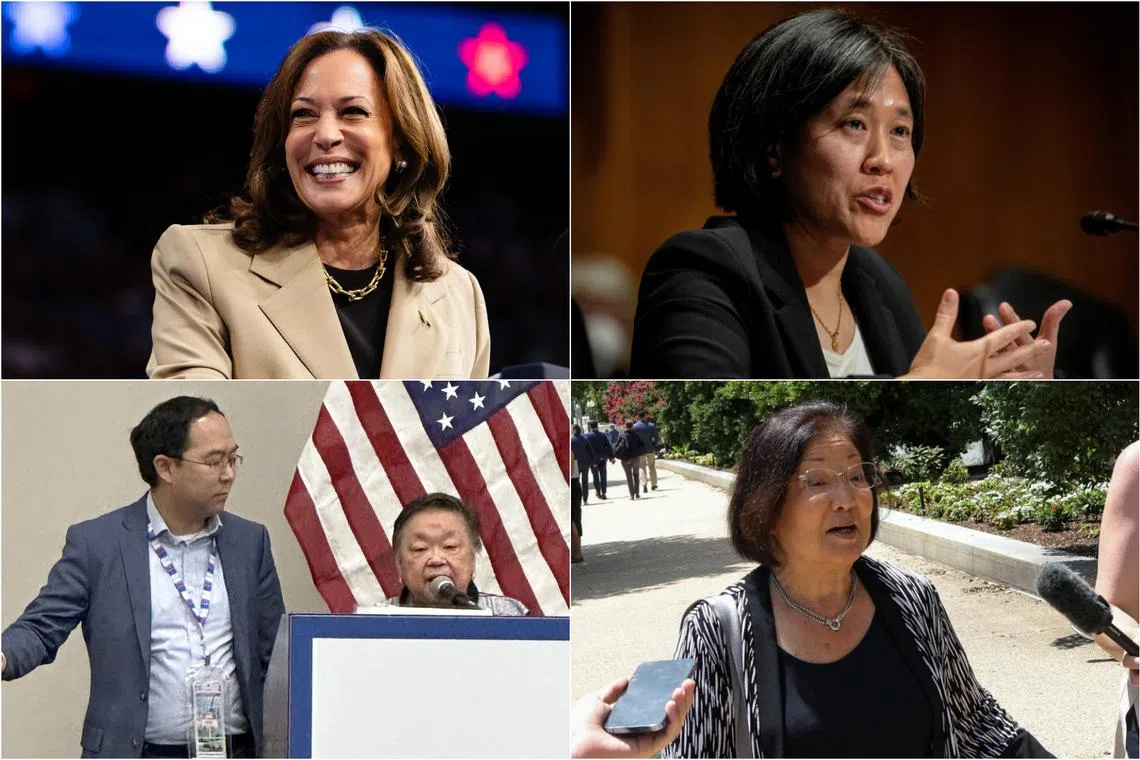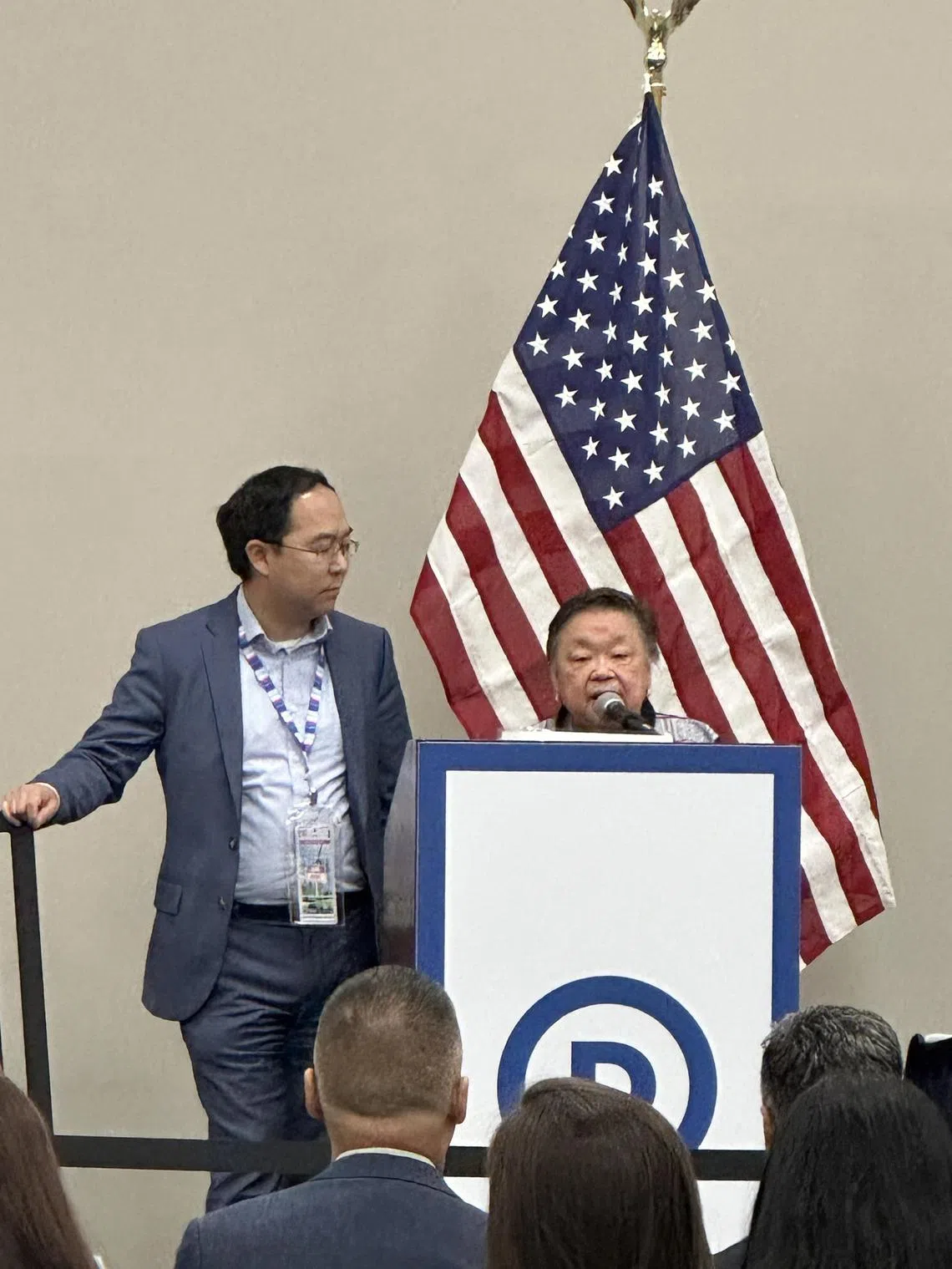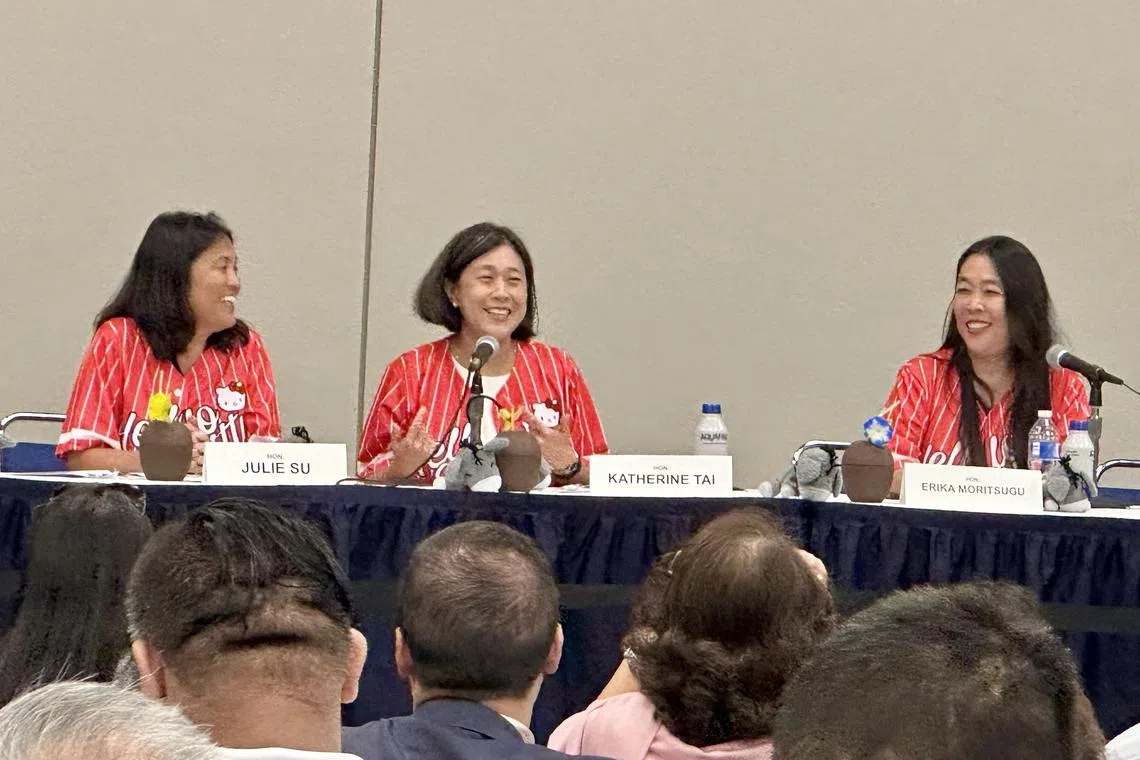With Kamala Harris leading Democrats in US elections, Asian Americans take centre stage
Sign up now: Get ST's newsletters delivered to your inbox

(Clockwise from top left) Ms Kamala Harris, Ms Katherine Tai, Ms Mazie Hirono, Ms Bel Leong-Hong and Mr Andy Kim.
PHOTOS: NYTIMES, REUTERS, BHAGYASHREE GAREKAR
CHICAGO – In Asia, she is the face of US President Joe Biden’s trade policy, drumming up enthusiasm for his signature Indo-Pacific Economic Framework for Prosperity while fending off questions about the protectionist turn in Washington.
At the Asian American and Pacific Islander (AAPI) caucus on Aug 21, held on the sidelines of the ongoing Democratic National Convention (DNC) in Chicago, Ambassador Katherine Tai went by the moniker “Cat Lady”. It was a sly dig by the Democrat at the 2024 Republican vice-presidential candidate, Mr J.D. Vance.
Mr Vance has drawn heaps of criticism for a 2021 video interview in which he derided Democratic presidential candidate Kamala Harris as emblematic of “childless cat ladies” who do not have a “direct stake” in America.
Kitted out in pink and white tops that featured the character Hello Kitty at the back, Ms Tai, 50, was seated on a simple stage with two other senior White House advisers who were participating in the caucus in their personal capacities.
It was a powerful expression of solidarity: Three Asian-American women gathered to show support for the first Asian-American presidential candidate.
It was a visual that spoke volumes about the dramatic extent by which the distance to the White House has shrunk for the Asian-American community, acknowledged as the fastest-growing community in the US.
Ms Tai, the daughter of parents who were born in mainland China and grew up in Taiwan, was the first Asian-American woman appointed to a Cabinet-level position under Mr Biden. She became the first non-white woman to serve as the US trade representative in the position’s 61-year history.
Next to her was Ms Julie Su, 55, the daughter of Chinese immigrants, a civil rights lawyer and acting labour secretary. “Julie is the American dream,” Mr Biden said in March 2023 when he unveiled her nomination, which remains to be confirmed by the US Senate.
Mr Biden also made waves in the community when he appointed the third woman seated at the table: Ms Erika Moritsugu, the first White House senior liaison to Asian American, Native Hawaiian and Pacific Islander communities.
The child of fourth-generation Japanese and fifth-generation Chinese immigrant parents, Ms Moritsugu was given the sensitive task of mending relations after thousands of hate incidents against Asian Americans were reported in the aftermath of former president Donald Trump calling Covid-19 the “Chinese virus” during the pandemic.
Her job is to bring the Asian-American voice into White House conversations. It is a voice that is increasingly loud, but not discordant as it might have been in the overwhelmingly white Republican Party’s July gathering in Milwaukee.
Japanese-born Senator Mazie Hirono, the first Asian-American woman elected to the Senate in 2013, announced as much. “We are the big tent,” she said, saluting the diversity in the corridors of Chicago’s United Centre arena.
Next door, the black American, Native American and lesbian, gay, bisexual, transgender and queer caucuses were at their own meetings.
“This is the democracy convention, not just the Democratic Convention, because democracy is on the line this year, and in Kamala Harris-Tim Walz, we have a diverse team,” said Ms Hirono, 76.
They were not the only high-profile Asian Americans in the room mapping out strategies to ensure the election of the most high-profile one of them all – Ms Harris, the daughter of immigrants from India and Jamaica.
There was Representative Andy Kim, the Democrats’ first Korean American in Congress, drawing applause as he laid out his own next big move.
Mr Kim, 42, turned heads when he won elections in a New Jersey congressional district which is 85 per cent white and less than 3 per cent Asian. It had voted for Trump twice.
“When I first ran for Congress six years ago, people said there was no way that an Asian-American Democrat would be able to win this district,” he recounted.
Well-meaning people advised him to move up north, “where there are a lot more people that look like you”.
Mr Kim took his chances, and has won the district thrice since 2019.
He is now seeking to become the first Korean American in the Senate in the Nov 5 elections.
Some congressional Republicans have mocked Ms Harris, calling her a “DEI hire” – an acronym for diversity, equity and inclusion.

Representative Andy Kim (left), the Democrats’ first Korean American to be elected to Congress, with Ms Bel Leong-Hong (right), who chairs the Asian American and Pacific Islander caucus at the Democratic National Committee.
ST PHOTO: BHAGYASHREE GAREKAR
The insult has a familiar ring for Mr Kim. “I have experienced this as an Asian American: People constantly underestimating me. Kamala is so qualified, so much better in temperament and expertise than Donald Trump. But some people are just not recognising and respecting the skills that brought her to where she is at now. It is deeply offensive,” he told The Straits Times.
But he is optimistic that both will be elected on the strength of their future-focused campaigns.
In gatherings like these, Asian Americans like to swop their “Kamala tales”. Ms Aruna Miller, the first Asian-American lieutenant governor in Maryland, shared hers to knowing chuckles from the audience. Born in the Indian city of Hyderabad, she spoke of a time her mother received a phone call from Ms Harris to wish her happy birthday.
As she related it, the Vice-President told her mother: “Auntie, we just want to say it is so wonderful to see your daughter and how successful she has been.”
“And my mum responds by saying, ‘You are much, much better,’” said Ms Miller.
The crowd erupted in laughter, recognising that familiar, pan-Asian cultural trait that prizes achievement and modesty at the same time.
If there is one thing that Mr Otto Lee wishes to hear from Ms Harris – who makes her ceremonial acceptance speech on Aug 23 – it is the exhortation to vote.
“As the Asian-American community, we are big on grades. But we get a D in voting. Just 55 per cent of us vote,” said the Hong Kong-born American, the elected supervisor in California’s Santa Clara County.
“Then there are those who register but, for whatever reason, don’t vote. That is like you finished your homework, but didn’t turn it in.”
Mr Lee thinks a good Asian-American turnout is what will make the difference for Ms Harris in key races in Nevada, Pennsylvania, Georgia and Wisconsin, all tightly contested swing states.
In Nevada, for example, Asian Americans and Pacific Islanders make up 10 per cent of its three million people. And the victory margin there is 2 per cent.
“We are the margin for victory,” he told ST.
Bankrolling such victories is the mission of Mr Shekar Narasimhan, a delegate from Virginia and founder of the AAPI Victory Fund. Founded nine years ago, his political action committee works to mobilise votes and support Democratic AAPI candidates.
“We are spending our energy this cycle working for the Harris-Walz ticket and against Donald Trump,” he said.

(From left) Acting Labour Secretary Julie Su, US Trade Representative Katherine Tai, and deputy assistant to the president and Asian American and Pacific Islander (AAPI) senior liaison Erika Moritsugu at the AAPI caucus in support of presidential candidate Kamala Harris.
ST PHOTO: BHAGYASHREE GAREKAR
In the 2024 elections, about 15 million Asian Americans are eligible to vote, up 15 per cent from the 2020 election. Two in three have traditionally voted for Democrats.
The AAPI vote in the seven swing states that matter is about 1.75 million, said Mr Narasimhan. Roughly 400,000 of them are eligible to vote but not yet registered, he added. The seven states are Arizona, Georgia, Michigan, Pennsylvania, Wisconsin, North Carolina and Nevada.
“We think we can increase our numbers, because they have already grown nationally. In the states that matter, we can increase our vote by 250,000,” he said.
He pointed out that Mr Biden won six of those seven states by a margin of 280,000. He won three of them – Arizona, Wisconsin and Georgia – by about only 45,000 votes.
“South Asians alone represent the margin of victory. We have enough AAPIs that can elect people up and down the ballot and retain the Senate,” he said.
“We are no longer the margin of victory. We are the reason for victory,” Mr Narasimhan added.
Behind the community’s growing footprint is Ms Bel Leong-Hong, who chairs the Democratic National Committee’s AAPI caucus. Mama Bel – as the community calls her – has nurtured the civic spirit in a generation of Asian Americans.
Her “Kamala story” is a whispered conversation that took place five years ago.
“When she came to visit me at the last in-person DNC meeting in San Francisco in 2019, I told her that in my lifetime, I wanted to see an Asian-American president,” said Ms Leong-Hong.
“This year, that prayer is going to come true.”



